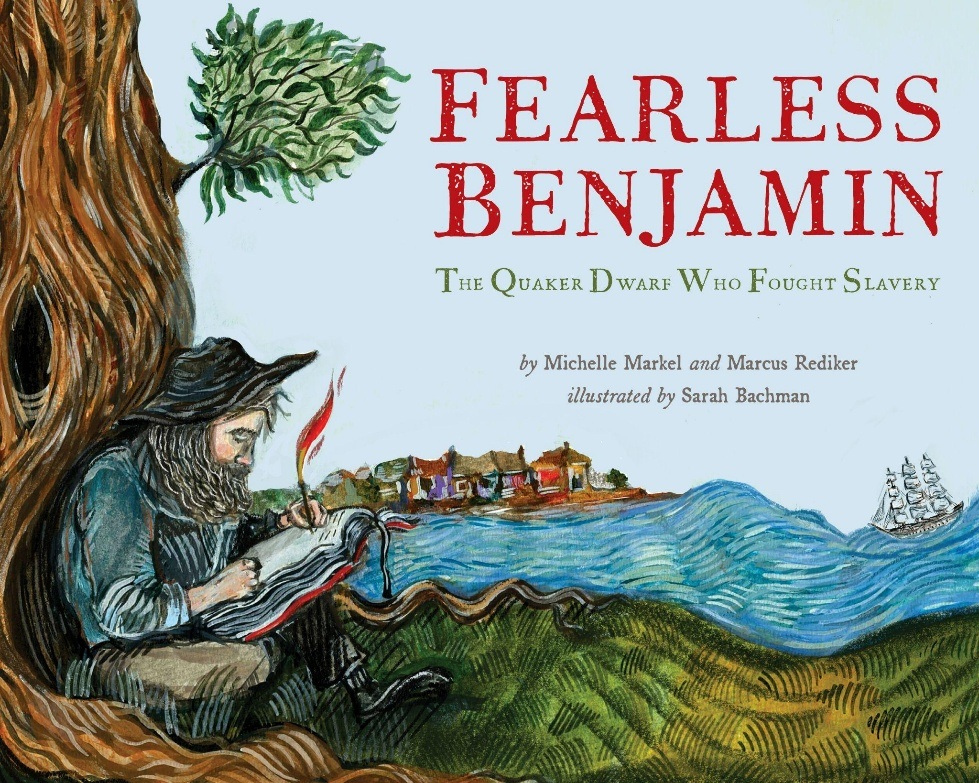
Photo credit: Martin Cohen
Ask the children. Chances are, I reckon, they’ll say Washington and Jefferson ought to have known better than to enslave people. And chances are, an adult will weigh in. The founding fathers can’t be judged by today’s standards; they were products of their time.
But they did know—or ought to have known—better. George Washington’s library included writings by the Quaker abolitionist Anthony Benezet (1713-1784). So did Thomas Jefferson’s.
Benezet’s abolitionism was propelled by the work of an even earlier writer, Benjamin Lay (1682-1759). You know, the little person who walked into a Quaker meetinghouse and pierced a bible with a sword, so that the fake blood in a hidden container splashed out of the book and onto the wealthy slave holders in the front seats.
A devout, third-generation Quaker, Lay could see quite clearly that slavery violated the Friends’ commitment to peace. And Lay was a consummate peace activist.
 This message came across sharply to visitors at the Abington Meetinghouse on a cold, windy evening, the 11th of November 2025. The children’s book author Michelle Markel, artist-illustrator Sarah Bachman, and historian Marcus Rediker had come to the meetinghouse to launch the trio’s book for children: Fearless Benjamin.
This message came across sharply to visitors at the Abington Meetinghouse on a cold, windy evening, the 11th of November 2025. The children’s book author Michelle Markel, artist-illustrator Sarah Bachman, and historian Marcus Rediker had come to the meetinghouse to launch the trio’s book for children: Fearless Benjamin.
With collective conviction, they described the way they had collaborated to produce the new work. All three had come over long distances to be present in a Pennsylvania Quaker meetinghouse during the chaos of a federal government shutdown, to bring Benjamin home—this time, for the kids. Michelle Markel read an excerpt aloud:
There’s a future world shaker in this village:
Benjamin, the farmer’s son.
People tease him for being little,
but he knows he’s full of goodness…
Products of Their Times?
Washington and Jefferson could have no authentic justification for owning people as property, Marcus Rediker told the gathering. Benjamin Lay’s life gives lie to the common thinking that these liberty-loving figures did their best. And as for William Penn (1644-1718), the Quaker colonist who founded Pennsylvania as a holy experiment in governance? Penn, who kept several people as slaves and reportedly ruptured a marriage to ship one away to Barbados, also knew better. In 1688, several prominent Philadelphia-area Quakers discerned the need for a petition against slavery, which they presented to Abington Meeting; it ultimately moved to the regional body, Philadelphia Yearly Meeting.
Yet Penn would die as an owner of people.
Penn’s father, Admiral William Penn, helped restore England’s monarchy in 1660—and was rewarded with land in subjugated Ireland. The grants from Charles II made the younger Penn England’s largest non-royal landowner.
Isn’t it time children were offered a chance to study those who gained from the oppression of no one, and who sacrificed their comfort and convenience to stand up for the oppressed? High time they were offered a committed troublemaker, said the creators of Fearless Benjamin—a folk hero for all times. And, dear readers, we’re talking seriously folk. Benjamin and partner Sarah (a Quaker lay minister and also a little person) made a library in a cave and lived in it. That alone seals their plausibility as style icons for a new generation.
The word is out, and now creators on TikTok celebrate Benjamin, Rediker told the visitors to Abington Meetinghouse. Like Greta Thunberg, Rediker mused, Benjamin demonstrates what can happen when we speak unremitting truth to authority, and refuse to be products of our times.
The young people are watching. They’re learning from those who sail the ever-moving seas of history. They witness whether we witness the world from resistance perspectives—or, instead, from the figures who prefer being around people who control social structures.
Benjamin personified resistance to those who would develop land, conquer nature, and take advantage of servitude in the mission to form some promised age. Benjamin and Sarah grew old simply, eating from their garden. Benjamin’s life testified to the early Quaker ethic of “keeping low” at its most profound level—learning to live on our planet in peace with our co-habitants. This spoke volumes about the kind of human integrity Benjamin sought in the world.
And yet, in a bitter twist, the weighty Quakers who ejected Benjamin from their congregations claimed Benjamin failed to display the ethic of keeping low.
Yes, the children present at the launch of Fearless Benjamin were just about old enough to understand that we were sitting in one of four Quaker meetinghouses that expelled Benjamin Lay. At least once, this sincere Quaker with dwarfism was actually tossed!
Revolutionary Vector
The Quakers ultimately adopted Benjamin’s opposition to slavery. Markel, Rediker, and Bachman all noted Benjamin’s major role in pressing the Quakers to become the first group to abolish slavery in their own congregations. Rediker has called Lay a “revolutionary vector” whose critique of slavery—offered decades before emancipation arose as a movement in the 1780s—had transatlantic impact.
Yet until Rediker published The Fearless Benjamin Lay (for adults) in 2017, Lay was, historically speaking, buried. Why? First, Lay was a worker. A sailor. A sailor with dwarfism. A human being who sensed the divine in all of animal life. Benjamin’s activism presented a pointed critique of enslavement that inconvenienced and implicated those who were most influential in forming the government and the narrative of the time. Lay imagined humanity living outside capitalism, renouncing violence to any living, feeling being. Not exactly the type most vaunted by the dominant curators of history.
At the book launch in Abington, Marcus Rediker vowed that Benjamin will never again be relegated to obscurity. Markel, Rediker, and Bachman had come from a future generation to retrieve Lay and tell the story of this hidden Quaker, to tell, as Rediker describes it, this history from below. But with conquerors, emitters and extractors all pushing their pedals to the metal, how much longer will our posterity endure?
In any case, the colonizers, the enslavers, the killers, the destroyers…their time will end. Life will not. Energy is never lost, young readers. Look to the First Law of Thermodynamics. Energy is never lost; it’s transferred or converted into some other form. Benjamin’s work will live on forever, in the immortal, collective soul that longs for love and liberation.
That said, it is not enough to pass justice and fairness off to the sweet by-and-by. At our current moment, we’re witnessing social disintegration; and the need for integration is both urgent and deep. The progress of justice, which many had considered reliable, is being diverted by force. Force wielded by police with government-given authority to push human beings into cages.
Fighting City Hall
Of the many memorable aspects of the book launch, one was Rediker’s thought that the statue of William Penn atop Philadelphia’s City Hall ought to be replaced with one of Benjamin. There was clapping, there was silence—all at once. Wow! I felt a momentary connection to the year 1738, when Benjamin challenged the weighty Quakers in their meetinghouse.
But it’s happened before. British Quakers renamed what used to be the Penn Room at the Friends’ House in London (the city where Penn was born). Some objected, considering the idea of deplatforming a flawed leader an unQuakerly decision. And yet, a core value of Quakers is openness to continuing revelation. And here is what history reveals, according to Trudy Bayer in the article Rethinking William Penn, published in the Friends Journal in January 2022:
In 1684 when the first slave ship, Isabella, arrived in Philadelphia, William Penn was at the dock to purchase some of the trafficked people.In a letter to the overseer of Penn’s plantation, Pennsbury Manor, Penn said “It was better they was blacks” than indentured servants, “for then a man has them while they live.”
Nevertheless, look who gets a hat tip from the Brooklyn Museum for the “Peace Movement” in Pennsylvania, and being “an early opponent” of slavery.
Colonialism, sustained oppression, and the fetishization of manufactured things all continue to plague humanity. The 1984 nightmare of a boot stamping on faces forever is a challenge to be dealt with, not just assigned in school. The revolutionary vector named Benjamin Lay warrants a reception in a new generation.
The post Fearless Benjamin: A History Lesson From Grownups of Integrity appeared first on CounterPunch.org.
From CounterPunch.org via this RSS feed


